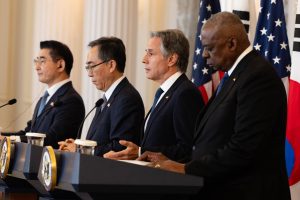South Korea and the United States held a 2+2 foreign and defense ministerial meeting in Washington on Thursday, a day after the North launched an intercontinental ballistic missile (ICBM). Amid rising security threats posed by North Korea and escalating tensions on the Korean Peninsula, the two sides held their first 2+2 meeting since 2021 to condemn the North’s ICBM test and its strengthened military coalition with Russia.
While calling the North’s ICBM launch and similar actions as “flagrant violations all of multiple U.N. Security Council resolutions,” U.S. Secretary of State Antony Blinken also highlighted the deployment of North Korean troops to Russia.
“Russia has been training DPRK soldiers in artillery, UAVs, basic infantry operations, including trench clearing, indicating that they fully intend to use these forces in frontline operations,” Blinken said during the joint press conference after the 2+2 meeting. (DPRK is an acronym of North Korea’s official name: Democratic People’s Republic of Korea.)
“Should these troops engage in combat or combat support operations against Ukraine, they would become legitimate military targets,” he warned.
Cho Tae-yul, South Korea’s foreign minister, also blamed the North for prolonging the ongoing Ukraine War caused by Russia’s invasion.
“The DPRK’s troop dispatch will further prolong Russia’s illegal war of aggression against Ukraine and place not only the Korean Peninsula but also Europe’s peace and security under a grave threat, a view that we shared,” Cho said. “Going forward, based on close information sharing and coordination as circumstances evolve, we agreed to take necessary measures accordingly.”
Late last year, the United States accused North Korea of supplying ammunition to Russia. When the leaders of the two countries exchanged visits – Kim Jong Un went to Russia in September 2023, and Russian President Vladimir Putin visited North Korea in June 2024 – it confirmed that the ties between Pyongyang and Moscow have been significantly strengthened. Kim and Putin even signed a security treaty during the latter’s visit to Pyongyang, the capital of North Korea. Amid these developments, Washington and Seoul’s concerns over such a dangerous coalition have risen further.
It is estimated that North Korea has sent around 10,000 troops to Russia. Although those units do not seem to have been deployed to the battlegrounds in Ukraine at this point, it is likely that North Korea will send more troops to Russia to help it achieve an unknown special military operation. If so, the United States and South Korea warned that those troops could be targeted by Ukrainian soldiers.
“If these North Korean troops engage in combat or combat support operations against Ukraine, they would make themselves legitimate military targets,” U.S. Defense Secretary Lloyd Austin said. He argued that the presence of North Korean soldiers was evidence “Putin’s forces have suffered serious losses,” thereby forcing Putin to go “tin cupping to North Korea for manpower.”
To cope with the situation and deter more possible provocations made by North Korea, Washington and Seoul reaffirmed their ironclad alliance and the United States’ extended deterrence capabilities on the Korean Peninsula. Also, along with the reinvigorated South Korea-U.S. joint military exercises, the two sides emphasized their regional trilateral cooperation with Japan to handle security conflicts on the Korean Peninsula.
With strengthening ties between Russia and North Korea, it is anticipated that Moscow will provide sensitive missile technologies and economic assistance in return for Pyongyang’s provision of men and materiel to support its war with Ukraine. Also, as Russia now helps shield North Korea from any consequences for its illicit ballistic missile developments, there would be no reason for Pyongyang to return to nuclear talks with Washington, even if former U.S. President Donald Trump, who famously met with Kim during his last term, is re-elected next week.
Thus, more major provocations will likely be made by North Korea and the Korean Peninsula will be destabilized further in the coming years with no prospects for renewing dialogue between the two Korea and stalled nuclear talks between the United States and North Korea.

































